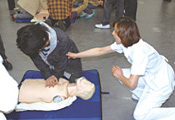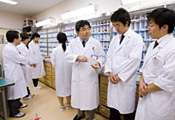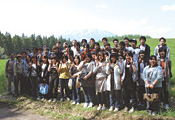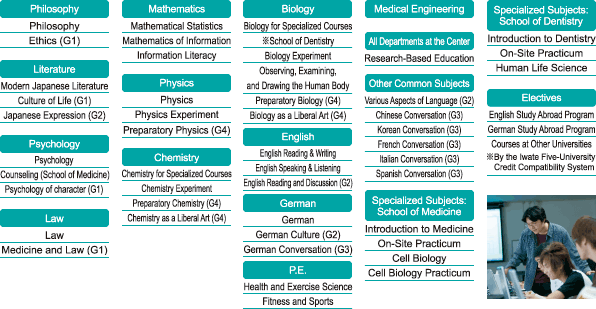Center for Liberal Arts and Sciences
Seeking the joy of learning and deepening of knowledge—nurture the intelligence and mind fit for the medical professionals of the future.
The Center for Liberal Arts and Sciences provides preparatory education and liberal arts education, which are common courses for the students of the School of Medicine, the School of Dentistry, and the School of Pharmacy. This function was originally provided by the former School of Liberal Arts. However, it became increasingly more difficult for each faculty to distinguish specialized education and liberal arts education; hence, in academic year 2007, when the School of Pharmacy was established, the Center for Liberal Arts and Sciences was additionally established on the Yahaba campus to provide liberal arts education mainly for the first-year students. In new classrooms equipped with the latest audio-visual facilities, the teaching staff are striving to make the courses and practicums interesting and fulfilling.
The Center is also meant as a planning division for research-based education, and will be developing a specialized course in life sciences common to all three faculties. Life science research is bound for obsolescence if it continues to be bound by the conventional specialized fields. It is important to get specialists from various fields involved to actively plan new interdisciplinary researches and to use them in education. In the future, students may conduct independent research under the guidance of professors from other faculties, or conduct a joint practicum with students from other faculties; the Center will help students by coordinating such programs.
The founding principle of “nurturing true and good human beings” is not simple. The education of medicine, dentistry, and pharmacology often involves harsh labor, and students may often feel fatigued physically or mentally. The Center will provide support for students, including social services, together with the Student Affairs Section.
Masatoshi MATSUMASA, Director, Center of Liberal Arts and Sciences
Special Subjects
 Research Based Education
Research Based Education- At the beginning, in the first semester of the first year, the University President will give a lecture on the attitude and awareness of medical professionals. Then, groups composed of mixed members from the three faculties will take part in research based education. They will identify problems in their theme, collect necessary data and discuss possible solutions. Through self-study, group work, discussions, and presentations, they will increase their motivation for studying at a medical university.
- On-Site Practicum
- By visiting medical, nursing, and nursing care facilities, students’ motivation for becoming a doctor, a dentist, or a pharmacist will be reconfirmed. The community medicine observation practicum will be conducted at medical and administrative facilities in Iwate, including medically underequipped areas. There are also nursing and nursing care practicums. Students will gain a deeper knowledge and understanding of the actualities through interaction with patients and those admitted in the facilities.
 Biology Experiment
Biology Experiment- Diverse life phenomena will be examined from the cellular level; students will gain a first-hand experience of investigating the universal morphology and functions of life forms.
 Information Science
Information Science- To nurture doctors, dentists, and pharmacists who can meet the demands of a highly advanced information society, information processing skills will be fostered through practical computer training.
- English Study Abroad Program
- This is an opportunity to gain practical literacy of English as well as a global perspective, through a short stay in English-speaking countries such as the U.S. or the U.K. From the home of the host family, students will go to a university or a language school to attend an intensive program. The study abroad program provides an opportunity to experience diverse values and crosscultural communication.
Liberal Arts Curriculum (Academic Year 2008)
